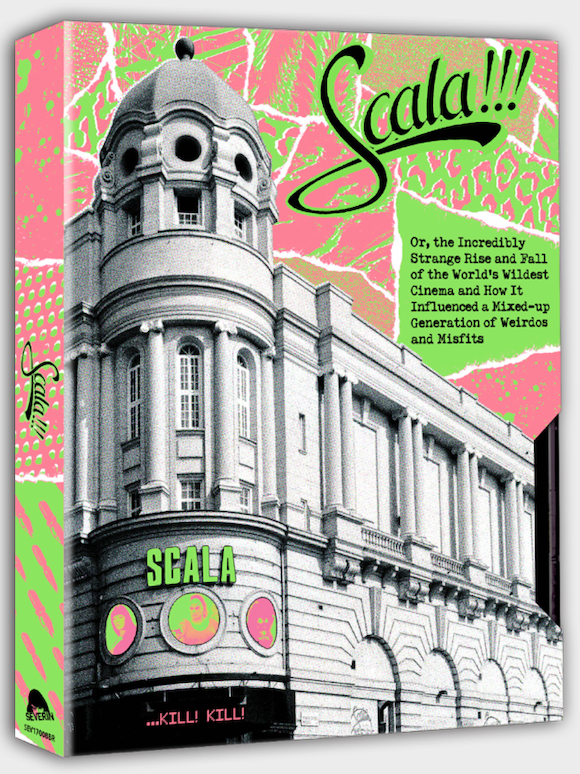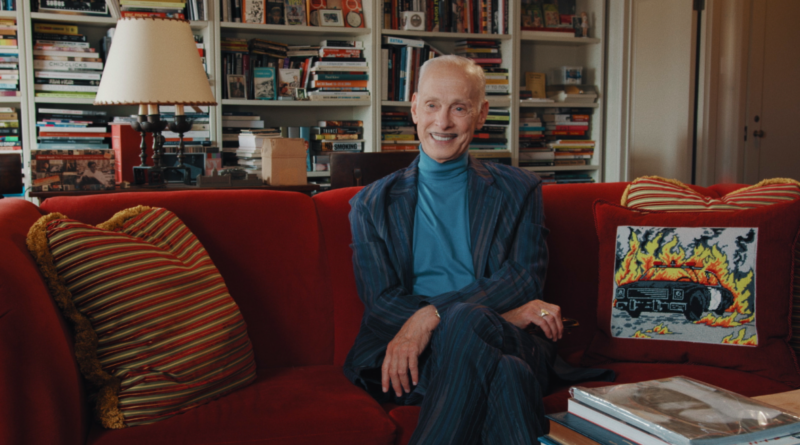INTERVIEW: London’s Scala deserves three exclamation points!!!
Photo: Infamous director John Waters is one of the subjects of the new documentary Scala!!! Photo courtesy of Severin Films / Provided by Foundry Comm with permission.
Scala!!!, the new documentary from directors Jane Giles and Ali Catterall, offers an idea of what the film is all about thanks to its secondary title: The Incredibly Strange Rise and Fall of the World’s Wildest Cinema and How It Influenced a Mixed-Up Generation of Weirdos and Misfits.
Take a breath after that one.
In other words, Scala is a love letter and nostalgia trip. The documentary, which is now available from Severin Films, looks at the cultural influence of this landmark cinema, which was located in a less-than-ideal setting in Kings Cross, London. This was a place that existed for 15 glorious years, from 1978 to 1993, and showcased self-described weird films from auteurs who have either stayed underground or gone on to great fame. Think horror, kung fu, John Waters.
The film is based on Giles’ book, which is included in a special bundle from Severin. She began the project several years ago, mostly because she has some vivid and beloved memories from attending Scala screenings herself and eventually working at the cinema.
“When the book came out in 2018, many people thought there was a documentary in the subject,” Giles said in a recent interview. “Also while I was writing the book, I came across lots of juicy archive footage by professionals and amateurs. There were lots of photographs, so all of that suggested that there was a film in it.”
At first, Giles and Catterall were thinking that the Scala story would make for a good sitcom, and they started down the TV development path. But in order to have conversations about a series, they needed a proof of concept, and they so reasoned that a documentary was the best first step.
“We also wanted to make a documentary that wasn’t like a usual, typical arts documentary,” Giles said. “It was something much more expressionistic than that, so that’s why the film is quite frenetic and fractured, also why it doesn’t have a sort of voice-of-God-style narration. It’s from the point of view of the audience, not from the point of view of the management.”
The list of influential people who are interviewed in the film is impressive, encompassing John Waters, Ben Wheatley, Jah Wobble, Cathi Unsworth, Mary Harron, Kim Newman, Nick Kent, Isaac Julien and Matt Johnson, among others. But this list didn’t come easy. In fact, many people said no when they pitched the idea of a movie about this provocative movie house.
“We initially reached out to probably 100-200 people, and we think some of our emails didn’t get further than the agent, quite honestly,” Catterall said. “But those who came forward for us really, really came forward, and they became part of our brilliant Scala treehouse.”
Giles added: “For some people who were too young or too geographically remote to have heard of the Scala, let alone have ever been there, I think the film still resonates as a sort of universal idea of what it’s like to be a young person discovering culture and something outside of their home upbringing for the first time. … It is a little bit Joni Mitchell. You don’t know what you’ve got until it’s gone. While we were working at the Scala in my case, or going as an audience member to the Scala in Ali’s case, I think that we knew that we really liked it, but whether or not we knew it was really special at the time, I’m not sure. The jury is out on that one.”
Scala also discusses the importance of LGBTQ+ programming and how the theater allowed many communities to find a safe place within its decaying walls. One source in the documentary is gay-rights activist Paul Burston, and Catterall loves one of his quotes in the film.
“At the time you were doing these things, you didn’t think of yourself as alternative, although in hindsight you clearly were,” Catterall paraphrased. “You were alternative, but you didn’t call yourself alternative. You just did those things.”
Giles can identify with those sentiments, especially when she was growing up in the late-1970s and early-1980s, yearning for a place to find something outside of the so-called mainstream culture.
“If you dressed in a certain way, people would point and laugh at you in the street,” she said. “If you dress weird, then people treat you weird. The minute I got on a train and came up to London, all of that just melted away. Nobody pointed and laughed at you in the street of London, and the Scala … was in a very difficult part of town. Kings Cross was a very sketchy and edgy neighborhood with lots of drug dealing, prostitution.”
Giles added: “The Scala was like this demented castle at the beginning of the Walt Disney [movies]. It was like that, but kind of grubby. That’s what it looked like to me. It looked like a fairy castle, and inside, even though you would be watching very extreme things on the screen, whether it was horror, gang violence or extreme sex … you felt enclosed and held by the building, which was a 478-seat cinema. It was big, very easy to be whoever you wanted or needed to be at the Scala. You could wear what you wanted. Nobody judged you.”
By John Soltes / Publisher / John@HollywoodSoapbox.com
Scala!!!, or The Incredibly Strange Rise and Fall of the World’s Wildest Cinema and How It Influenced a Mixed-Up Generation of Weirdos and Misfits, directed by Jane Giles and Ali Catterall, is now available from Severin Films. Click here for more information.


